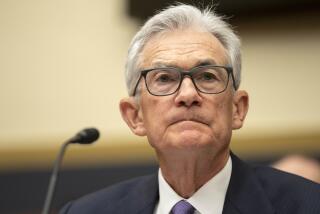Bernanke sees ’08 rebound
- Share via
WASHINGTON — Federal Reserve Chairman Ben S. Bernanke acknowledged Wednesday that a recession was possible, but he predicted a rebound by year’s end, declaring in effect that the central bank had done its job and it now was up to Congress to tackle the still-deepening housing crisis.
Bernanke also signaled that the Fed was unlikely to continue to cut interest rates aggressively. And he made clear that, although housing was “at the center” of the country’s economic woes, preventing foreclosures and helping struggling mortgage holders were outside the Fed’s area of responsibility.
Bernanke’s remarks before the Joint Economic Committee of Congress appeared to lend the weight of his position to congressional leaders who are pushing for quick action to forestall foreclosures, restructure the mortgage market and speed the refinancing of troubled loans.
“I think housing is very important, and we need to address it. But of course that’s the Congress’ sphere of influence, not the Fed’s,” he told the panel.
He also urged lawmakers to address longer-term economic needs by developing alternative energy sources and boosting investment in education and worker retraining.
Describing the immediate economic outlook, however, Bernanke used his grimmest language to date.
“It now appears likely that real gross domestic product will not grow much, if at all, over the first half of 2008 and could even contract slightly,” he said. And, after months of avoiding it, he used the word “recession,” but only to concede that it was “possible.” And he expressed optimism that the clouds would lift by the end of the year.
“Much necessary economic and financial adjustment has already taken place, and monetary and fiscal policies are in train that should support a return to growth in the second half of this year and next year,” he said, noting that the central bank had lowered its benchmark federal funds rate by 3 percentage points since the crisis began last year, bringing it to 2.25%.
Fed watchers saw that as a signal that Bernanke might preside over another small rate cut before the summer but that the federal funds rate was unlikely to go below 2%.
“An end to policy easing is in sight,” said Vincent Reinhart, a former director of the Federal Reserve’s division of monetary affairs and a fellow at the American Enterprise Institute.
For the first time, Bernanke publicly defended the Fed’s decision last month to help underwrite the buyout of troubled Wall Street brokerage Bear Stearns Cos. by JPMorgan Chase & Co.
Bernanke said the central bank intervened -- lending money to firms other than traditional depository banks for the first time in more than 70 years -- because of the danger that Bear Stearns’ collapse would shake the entire economy, leading to severe consequences for ordinary Americans.
“We did what we did because we felt it was necessary to preserve the integrity and viability of the American financial system, which in turn is critical for the health of the economy,” Bernanke said. “Always in my mind . . . was what was the best thing for the American public . . . not to help individual Wall Street people.”
Pressed on whether other Wall Street firms were in similar dire straits, Bernanke said he was aware of none.
“The financing that we did for Bear Stearns is a one-time event,” he said. “It has never happened before, and I hope it never happens again.”
The Fed chairman returns to Congress today to testify specifically about the Bear Stearns deal.
The lawmakers questioning Bernanke appeared less intent on criticizing the Fed’s efforts on Wall Street than on underscoring the need to help people on Main Street.
“What about government intervention in the housing market?” asked Sen. Charles E. Schumer (D-N.Y.), chairman of the committee. “Admittedly, each homeowner does not pose systemic risk, but as a group, they do. And how can one justify going in with government backup for Bear or any large financial institution, but not for the millions of homeowners?”
Bernanke called the Wall Street-Main Street distinction a “false dichotomy.”
“Anybody who wants to borrow for a mortgage, for a house or for other purposes, anyone who has an investment account with stocks and other assets in it, anyone whose company wants to acquire capital to expand employment needs to have a healthy, functioning financial system,” Bernanke said.
And time after time, he turned the question of mortgages back to the lawmakers, saying that addressing the housing crisis was primarily their responsibility.
Diane Swonk, chief economist at Mesirow Financial in Chicago, said Bernanke was trying to send a message that the Fed had done most of what it could. “He was saying, ‘We can’t cure this problem,’ ” Swonk said of the housing crisis. “It’s something that has to work itself out. And the only one who can make it go faster is Congress.”
Congress is working on two housing bills -- one that would provide short-term funding for mortgage counseling and refinancing, and a longer-term bill that would encourage lenders to write down the balances on troubled mortgages by providing government guarantees for some refinanced loans.
Bernanke repeatedly urged Congress to use its legislative authority to tackle two other areas with long-term economic effects: education and energy. Without better education for American workers, and without developing sources of energy other than oil, the economy will face new crises in the future, he warned.
“Education is critical to get people to have the skills so that they can earn sufficient incomes,” Bernanke said. And on energy, “we need to have better research and we need to have cleaner energy. We need to have better structured regulations that allow alternative energy to take its appropriate role in the economy.”
After more than two hours and multiple rounds of questioning, Bernanke appeared to have won over his questioners. Schumer, for one, praised Bernanke for his poise and responsiveness.
“You’ve been chair two years,” Schumer said. “You’re getting the knack of this.”
--
More to Read
Inside the business of entertainment
The Wide Shot brings you news, analysis and insights on everything from streaming wars to production — and what it all means for the future.
You may occasionally receive promotional content from the Los Angeles Times.










